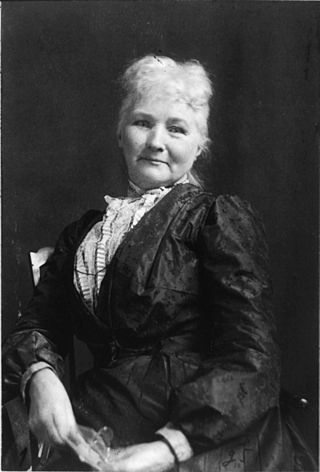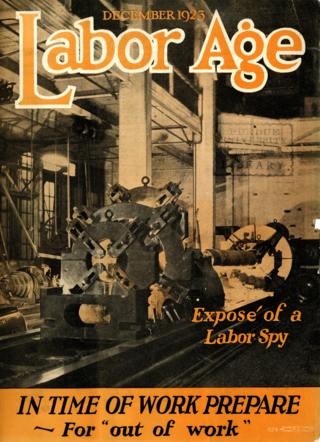Related Research Articles

The Knights of Labor, officially the Noble and Holy Order of the Knights of Labor, was an American labor federation that was active in the late 19th century, especially the 1880s. It operated in the United States as well in Canada, and had chapters also in Great Britain and Australia. Its most important leader was Terence V. Powderly. The Knights of Labor promoted the social and cultural uplift of the worker, and demanded the eight-hour day. In some cases it acted as a labor union, negotiating with employers, but it was never well organized or funded. It was notable in its ambition to organize across lines of gender and race and in the inclusion of both skilled and unskilled labor. After a rapid expansion in the mid-1880s, it suddenly lost its new members and became a small operation again. The Knights of Labor had served, however, as the first mass organization of the white working class of the United States.
A trade union or labor union, often simply referred to as a union, is an organization of workers whose purpose is to maintain or improve the conditions of their employment, such as attaining better wages and benefits, improving working conditions, improving safety standards, establishing complaint procedures, developing rules governing status of employees and protecting and increasing the bargaining power of workers.

Mary G. Harris Jones, known as Mother Jones from 1897 onward, was an Irish-born American labor organizer, former schoolteacher, and dressmaker who became a prominent union organizer, community organizer, and activist. She helped coordinate major strikes, secure bans on child labor, and co-founded the socialist trade union, the Industrial Workers of the World (IWW).

The United Auto Workers (UAW), fully named International Union, United Automobile, Aerospace and Agricultural Implement Workers of America, is an American labor union that represents workers in the United States and southern Ontario, Canada. It was founded as part of the Congress of Industrial Organizations (CIO) in the 1930s and grew rapidly from 1936 to the 1950s. The union played a major role in the liberal wing of the Democratic Party under the leadership of Walter Reuther. It was known for gaining high wages and pensions for automotive manufacturing workers, but it was unable to unionize auto plants built by foreign-based car makers in the South after the 1970s, and it went into a steady decline in membership; reasons for this included increased automation, decreased use of labor, mismanagement, movements of manufacturing, and increased globalization. After a successful strike at the Big Three in 2023, the union organized its first foreign plant (VW) in 2024.
The Communist Party (CP) and its allies played a role in the United States labor movement, particularly in the 1930s and 1940s, but largely wasn't successful either in bringing the labor movement around to its agenda or in converting their influence in any particular union into membership gains for the Party. The CP has had only negligible influence in labor since its supporters' defeat in internal union political battles in the aftermath of World War II and the Congress of Industrial Organizations's (CIO) expulsion of unions in which the party held the most influence in 1950. The expelled parties were often raided by stronger unions, and most withered away.

The nature and power of organized labor in the United States is the outcome of historical tensions among counter-acting forces involving workplace rights, wages, working hours, political expression, labor laws, and other working conditions. Organized unions and their umbrella labor federations such as the AFL–CIO and citywide federations have competed, evolved, merged, and split against a backdrop of changing values and priorities, and periodic federal government intervention.

William George Meany was an American labor union administrator for 57 years. He was important for the creation of the AFL–CIO and served as the AFL–CIO's first president, from 1955 to 1979.
Jennifer Gordon founded the Workplace Project in 1992, a non-profit worker center in Hempstead, New York, which organizes immigrant workers, mostly from Central and South America. The Workplace Project lobbied for and won a strong wage enforcement law in New York state. Gordon was the executive director of the Workplace Project from 1993 to 1998. Gordon was a MacArthur Fellow from 1999 to 2004. She is the author of Suburban Sweatshops: The Fight for Immigrant Rights, as well as several articles on immigrants, politics, and labor unions. She received a Bachelor of Arts degree from Radcliffe College of Harvard University in 1987 and a Juris Doctor degree from Harvard Law School in 1992. She is currently an associate professor at Fordham University School of Law, where she teaches courses on immigration and labor law.
John Earl Haynes is an American historian who worked as a specialist in 20th-century political history in the Manuscript Division of the Library of Congress. He is known for his books on the subject of the American Communist and anti-Communist movements, and on Soviet espionage in America.

Labor unions represent United States workers in many industries recognized under US labor law since the 1935 enactment of the National Labor Relations Act. Their activity today centers on collective bargaining over wages, benefits, and working conditions for their membership, and on representing their members in disputes with management over violations of contract provisions. Larger labor unions also typically engage in lobbying activities and electioneering at the state and federal level.
Justice for Janitors (JfJ) is a social movement organization that fights for the rights of janitors across the US and Canada. It was started on June 15, 1990, in response to the low wages and minimal health-care coverage that janitors received. Justice for Janitors includes more than 225,000 janitors in at least 29 cities in the United States and at least four cities in Canada. Members fight for better wages, better conditions, improved healthcare, and full-time opportunities.
Joseph A. McCartin is a professor of history at Georgetown University whose research focuses on labor unions in the United States. He also serves as the executive director of the Kalmanovitz Initiative for Labor and the Working Poor.
Ellen Wolf Schrecker is an American professor emerita of American history at Yeshiva University. She has received the Frederick Ewen Academic Freedom Fellowship at the Tamiment Library at NYU. She is known primarily for her work in the history of McCarthyism. Historian Ronald Radosh has described her as "the dean of the anti-anti-Communist historians."

Ruth Milkman is an American sociologist of labor and labor movements. She is Distinguished Professor of Sociology at the CUNY Graduate Center and the director of research at CUNY School of Labor and Urban Studies. Between 1988 and 2009 Milkman taught at the University of California, Los Angeles, where she directed the UCLA Institute for Research on Labor and Employment.
Rhodri Jeffreys-Jones is professor of American history emeritus and an honorary fellow in History at the University of Edinburgh, Scotland. He is an authority on American intelligence history, having written two American intelligence history surveys and studies of the CIA and FBI. He has also written books on women and American foreign policy, America and the Vietnam War, and American labor history.

Labor Age was a monthly political magazine published by the Labor Publication Society from 1922 to 1933.

The 1926 Passaic textile strike was a work stoppage by over 15,000 woolen mill workers in and around Passaic, New Jersey, over wage issues in several factories in the vicinity. Conducted in its initial phase by a "United Front Committee" organized by the Trade Union Educational League of the Workers (Communist) Party, the strike began on January 25, 1926, and officially ended only on March 1, 1927, when the final mill being picketed signed a contract with the striking workers. It was the first Communist-led work stoppage in the United States. The event was memorialized by a seven reel silent movie intended to generate sympathy and funds for the striking workers.

Wyndham Mortimer was an American trade union organizer and functionary active in the United Auto Workers union (UAW). Mortimer is best remembered as a key union organizer in the 1937 Flint Sit-Down Strike. Mortimer was the First Vice President of the UAW from 1936 to 1939. A member of the Communist Party USA from about 1932, Mortimer was a critic of the efforts of the conservative American Federation of Labor to control the union and was a leader of a so-called "Unity Caucus" which led the UAW to join forces with the more aggressive Congress of Industrial Organizations (CIO).

Sarumathi "Saru" Jayaraman is an American attorney, author, and activist from Los Angeles, California. She is an advocate for fair wages for restaurant workers and other service workers in the United States. In the aftermath of September 11, she co-founded the non-profit public service organization Restaurant Opportunities Centers United. And in 2013 she founded a new organization to work on these issues, called One Fair Wage. Jayaraman is a recipient of the Ashoka fellowship in 2013 and the Soros Equality Fellowship in 2020.
Eric Arnesen is an American historian. He is currently the James R. Hoffa Professor of Modern American Labor History at George Washington University. He was a Fulbright Scholar, and is a member of the Organization of American Historians.
References
- ↑ "Jennifer Luff". Political Science. 31 May 2023. Retrieved 1 December 2023.
- ↑ "Announcing the 2024-25 Davis Center Fellows and Postdocs". Department of History. Retrieved 31 May 2024.
- ↑ "Organizing: A Secret History". The Forge. 24 September 2019. Retrieved 14 February 2020.
- ↑ "KI Research Director Jennifer Luff Discusses New Book". lwp.georgetown.edu. 2 October 2012. Retrieved 14 February 2020.
- ↑ "What Works for Workers? | RSF | 978-0-87154-571-8". www.russellsage.org. Retrieved 14 February 2020.
- ↑ "Justice For Janitors DC: A Digital History". www.georgetownlaborhistory.org. Retrieved 14 February 2020.
- ↑ "Research Guides: Cold War Research Guide: Past Fellows".
- ↑ John Earl Haynes, review of Commonsense Anticommunism in Journal of Cold War Studies vol. 15 (2013), 140-41.
- ↑ Review of Commonsense Anticommunism in Choice, Vol. 50, no. 5 (Jan 2013), 947.
- ↑ Janice Fine, review of What Works for Workers? in American Journal of Sociology vol. 121 (2015), 648.
- ↑ Jennifer Luff Interview 15/10/18 , retrieved 14 February 2020
- ↑ https://files.royalhistsoc.org/wp-content/uploads/2020/04/27142543/RHS-Fellows-L.pdf [ bare URL PDF ]
- ↑ Luff, Jennifer (8 December 2016). "Labor Anticommunism in the United States of America and the United Kingdom, 1920–49". Journal of Contemporary History. 53 (1): 109–133. doi:10.1177/0022009416658701. ISSN 0022-0094. S2CID 157825297.
- ↑ Luff, Jennifer (1 June 2017). "Covert and Overt Operations: Interwar Political Policing in the United States and the United KingdomCovert and Overt Operations". The American Historical Review. 122 (3): 727–757. doi:10.1093/ahr/122.3.727. ISSN 0002-8762.
- ↑ Luff, Jennifer (2013). "Rethinking Interwar Conservatism, Communism, and State Repression". Journal of the Historical Society. 13 (2): 101–114. doi:10.1111/jhis.12007. ISSN 1540-5923.
- ↑ Luff, Jennifer (2013). "Response to Commentary". Journal of the Historical Society. 13 (2): 157–162. doi:10.1111/jhis.12014. ISSN 1540-5923.
- ↑ Mooney, Jadwiga E. Pieper; Lanza, Fabio (25 January 2013). De-Centering Cold War History : Local and Global Change. Routledge. doi:10.4324/9780203083277. ISBN 978-0-203-08327-7.
- ↑ Luff, Jennifer (1 March 2008). "Surrogate Supervisors: Railway Spotters and the Origins of Workplace Surveillance". Labor. 5 (1): 47–74. doi:10.1215/15476715-2007-055. ISSN 1547-6715.